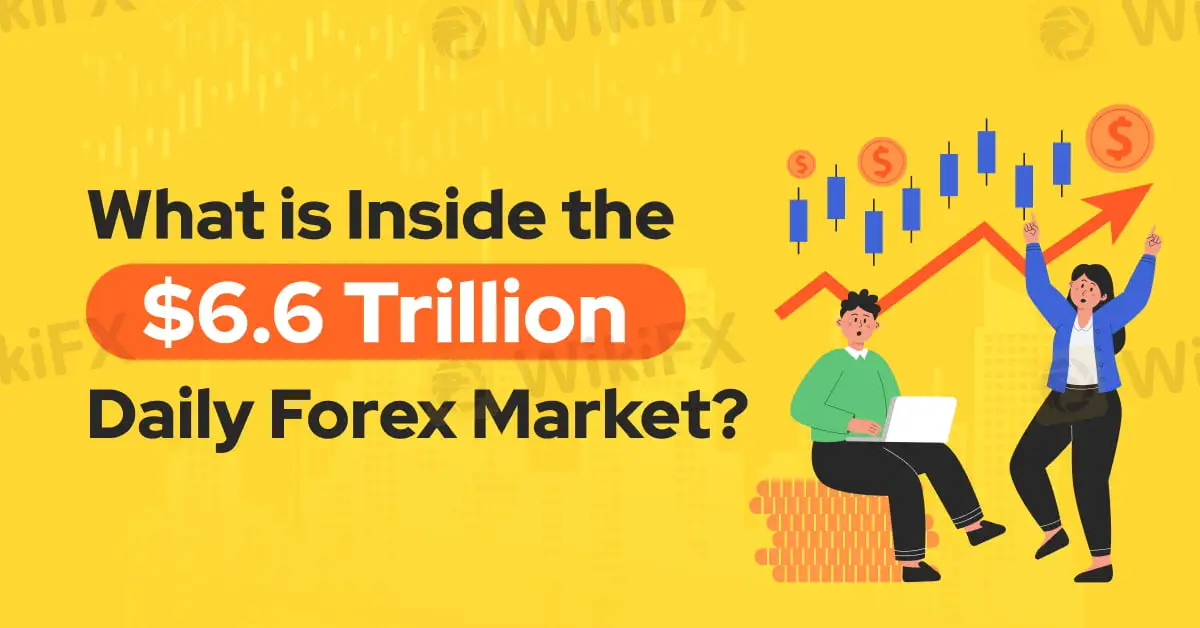简体中文
繁體中文
English
Pусский
日本語
ภาษาไทย
Tiếng Việt
Bahasa Indonesia
Español
हिन्दी
Filippiiniläinen
Français
Deutsch
Português
Türkçe
한국어
العربية
What is Inside the $6.6 Trillion Daily Forex Market?
Abstract:This article explores the vast influence of the $6.6 trillion foreign exchange market, its role in global trade, the impact of the floating exchange rate system, and the key players shaping currency values.

The foreign exchange (forex) market stands as one of the most influential and dynamic financial markets in the world. With a staggering daily trading volume of approximately $6.6 trillion, the forex market dwarfs the combined trading volumes of major global stock exchanges. This immense market size reflects the critical role forex plays in global economics, where currency exchange is integral to international trade, investment, and economic policy.
The growth of global trade, driven by the principle of comparative advantage, has necessitated the development of a robust and fluid foreign exchange market. Comparative advantage enables countries to specialize in the production of goods they can produce most efficiently, leading to a thriving international trade network. As goods and services flow across borders, so too does the need for currency exchange, reinforcing the importance of the forex market in the global economy.

The evolution of the forex market can be traced back to the collapse of the Bretton Woods system in the 1970s. Under Bretton Woods, currencies were pegged to the US dollar, which in turn was tied to gold. The system's collapse led to the adoption of floating exchange rates, where currencies are traded freely on the open market, much like commodities. This shift significantly increased the influence and volatility of the forex market, as currencies began to fluctuate based on supply and demand dynamics.
Key players in the forex market include businesses, investors, and governments, each with distinct motivations and strategies. Businesses engage in forex trading to support their international operations, such as opening new stores abroad or paying suppliers in different currencies. Investors, on the other hand, use forex to hedge against currency risks or to speculate on exchange rate movements, often employing financial instruments like derivatives to maximize profits. Governments also play a crucial role in the forex market, often manipulating their currencies to achieve economic objectives. For instance, China has been known to devalue its currency to make its exports more competitive on the global stage.
Despite the forex market's importance, the intrinsic value of currencies remains a complex and often debated topic. Unlike tangible goods, currencies, shares, and derivatives lack intrinsic value; their worth is determined by market perception and what others are willing to exchange for them. This concept is exemplified by the British Pound, which remains one of the most valuable currencies globally, largely due to historical factors rather than solid economic foundations.
In essence, the forex market's vast scale, influence, and complexity underscore its pivotal role in the global economy. It facilitates international trade, supports investment strategies, and allows governments to pursue economic policies, all while operating in a landscape where the value of currencies is determined by perception rather than intrinsic worth.

Disclaimer:
The views in this article only represent the author's personal views, and do not constitute investment advice on this platform. This platform does not guarantee the accuracy, completeness and timeliness of the information in the article, and will not be liable for any loss caused by the use of or reliance on the information in the article.
Read more

WikiFX Review: Is Ultima Markets Legit?
Ultima Markets has played a significant role in the forex trading industry for decades. WikiFX created a comprehensive review to help you better understand this broker. We will analyze its reliability based on specific information, regulations, etc. Let’s get into it.

WikiFX Review: Is FXTRADING.com still reliable?
FXTRADING.com is an online brokerage firm that offers trading services for various financial instruments such as forex, cryptocurrencies, shares, commodities, spot metals, energies, and indices. WikiFX has comprehensively reviewed this broker by analyzing its regulations, specific information, etc. so that you have a deep understanding of this broker.

Financial Educator “Spark Liang” Involved in an Investment Scam?!
A 54-year-old foreign woman lost her life savings of RM175,000 to an online investment scam that promised high returns within a short timeframe. The scam was orchestrated through a Facebook page named "Spark Liang."

The Hidden Checklist: Five Unconventional Steps to Vet Your Broker
Forex broker scams continue to evolve, employing new tactics to appear credible and mislead unsuspecting traders. Identifying these fraudulent schemes requires vigilance and strategies beyond the usual advice. Here are five effective methods to help traders assess the legitimacy of a forex broker and avoid potential pitfalls.
WikiFX Broker
Latest News
AIMS Broker Review
The Hidden Checklist: Five Unconventional Steps to Vet Your Broker
YAMARKETS' Jingle Bells Christmas Offer!
Why is there so much exposure against PrimeX Capital?
Russia to Fully Ban Crypto Mining in 10 Regions Starting January 1, 2025
Two Californians Indicted for $22 Million Crypto and NFT Fraud
WikiFX Review: Is Ultima Markets Legit?
Colorado Duo Accused of $8M Investment Fraud Scheme
MTrading’s 2025 "Welcome Bonus" is Here
Malaysia Pioneers Zakat Payments with Cryptocurrencies
Currency Calculator


